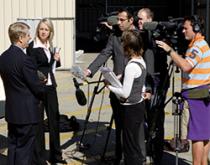The Bureau observes a G5 geomagnetic storm
11/05/2024
Issued Saturday 11 May 2024
The Bureau of Meteorology's Australian Space Weather Forecasting Centre has observed a geomagnetic storm event of level G5 (extreme) on the global G-scale.
The Bureau issued a geomagnetic storm warning at 6:20 am that indicated a chance of G5 geomagnetic storm conditions during 11 May 2024.
Observed geomagnetic conditions within Australia are currently lower than the planetary average, at Geomagnetic Storm G3 - Strong conditions. The intensity of geomagnetic storms in Australia is usually lower than the planetary average.
The last time a G5 geomagnetic storm was observed was in 2003.
The warning issued for this event informs government and critical infrastructure operators so they can take action to mitigate potential impacts on infrastructure assets and essential services.
The Bureau predicts that these geomagnetic conditions are likely to continue throughout 11 May.
The G-scale is a measure of global geomagnetic activity, which refers to fluctuations in the Earth’s magnetic field across the globe. The G-scale ranges from G1 (minor) to G5 (extreme).
This event is a result of four Coronal Mass Ejection (CME) space weather events observed at 3:36 pm AEST and 10:24 pm AEST on Wednesday, 8 May 2024, and at 8:24 am AEST and 7:36 pm AEST on Thursday, 9 May 2024. Two further CMEs have been observed since, however these are not contributing to the current geomagnetic conditions.
Geomagnetic storms of G5 level can potentially disrupt:
- critical infrastructure such as power grids, causing power outages
- satellite services, affecting communications and global position, navigation and timing services that use high-frequency radio communication
The Bureau continues to monitor the situation and will provide updates of significant changes.
When G5 geomagnetic conditions occur, bright auroras will be visible at unusually low latitudes, including dark-sky locations near Sydney and Perth.
Auroras may also be visible from as far north as southern Queensland and other low-latitude locations.
The Bureau of Meteorology's Australian Space Weather Forecasting Centre (ASWFC) is the official source of space weather forecasts, alerts and warnings in Australia.
More information: Space Weather, Australian Bureau of Meteorology (bom.gov.au)
ENDS










